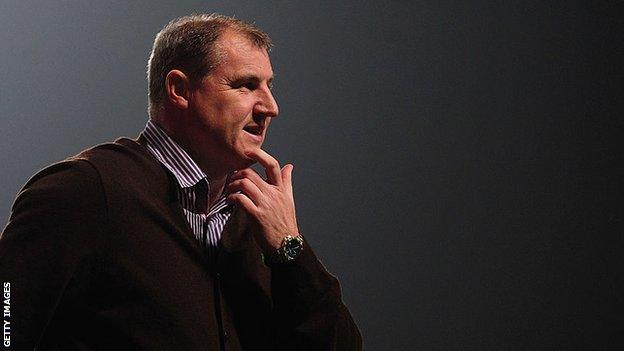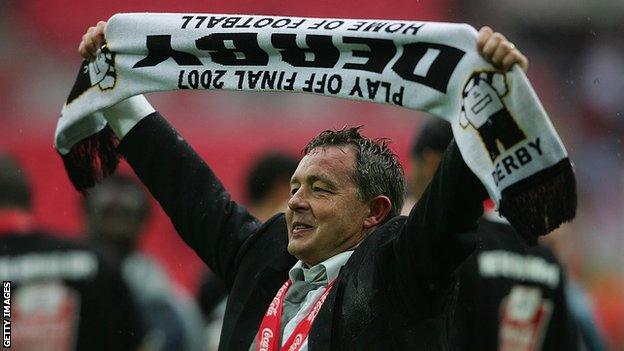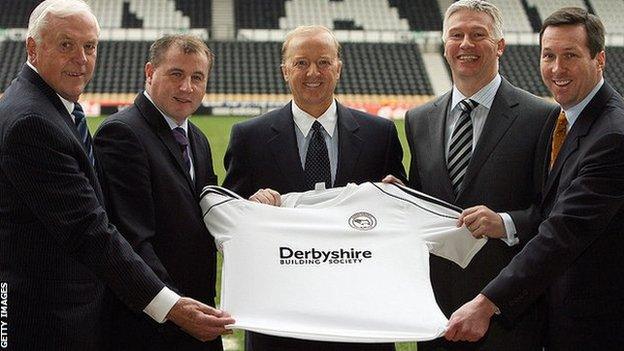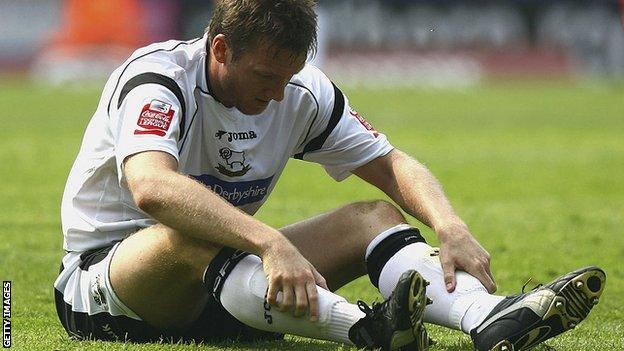Derby County 2007-08: 'We threw the towel in' - the story of the Premier League's worst team
- Published

Paul Jewell's record as Derby manager in the Premier League: 24 games, no wins, five draws, 19 defeats, one relegation and one unwanted record
"My career never really recovered from going to Derby County," says Paul Jewell, who oversaw 24 games as manager of the worst team in Premier League history.
During the 2007-08 campaign, the Rams, who had been promoted via the Championship play-offs, recorded the lowest points tally ever seen in the league (11), scored just 20 goals and conceded 89. They won only one game.
Sheffield United's terrible start to this season - worse even than Derby's 14 years ago - led to speculation they might take that unwanted title as the Premier League's poorest side. However, despite having to wait until their 19th game for a victory, three wins in five matches at the start of 2021 means the Blades have drawn level with the Rams' tally of 11 points, and have almost half a season to surpass it.
"The two situations are completely different," says Jewell, who replaced Billy Davies midway through that fateful season.
"Sheffield United did it in the Premier League last season, so they know they can do it. I've never seen a team as frightened and out of its depth as that Derby team - and the players knew it. They weren't silly lads; they would come into my office and talk about it. We just weren't good enough, and I have to put myself in that and take responsibility because I was manager for 24 games."

Billy Davies was sacked as Derby manager in November 2007, six months after winning promotion via the Championship play-offs
'I can say it now, the towel went in'
While there was a buzz around the club after promotion, clouds quickly began to form. Despite topping the table at times during that season, Derby's chances of going up automatically had gradually eroded after a run of four wins in their final 10 Championship matches. After their Wembley victory, Davies was less than committal amid talk of a takeover, which eventually happened during their infamous Premier League campaign.
The likes of Robert Earnshaw, Kenny Miller - top scorer with four league goals - Claude Davis, Andy Griffin and Andy Todd joined as part of a summer recruitment drive which lacked proven quality at the highest level.
"You have to front it up and accept that it is an embarrassment," says Todd, son of club legend Colin. "I sensed in pre-season we weren't going to have enough, but you thought: 'OK, everyone is writing us off and expecting us to go down, there's no pressure, let's have a go.'
"The manner in which it happened was like - and I can say it now - the towel went in early. It is a disgusting thing to say, but it is true. Too many of us threw the towel in."
Griffin and Todd made their debuts on the opening day against Portsmouth, with the latter scoring in a 2-2 draw at Pride Park.
That result proved to be something of a false dawn. A run of four defeats followed, including a 4-0 loss at Tottenham Hotspur before conceding six to Liverpool. Chelsea would win 6-0 later in the season, and there were other hefty losses to the likes of West Ham United and Aston Villa.
"We drew against a good Portsmouth team. Harry [Redknapp] was their manager and Billy Davies said to us afterwards that maybe the Premier League wasn't the monster we all thought it was," Griffin adds. "But obviously that changed very quickly.
"You have to look at the players. We weren't good enough collectively, obviously, but maybe there were some who thought they were better than they were. There is no real shame if you don't have the players, if you have given your all against a great Chelsea team and an exceptional Liverpool team.
"Maybe we could have worked our defensive shape a lot more. We were a fit team, a relatively young team, but if you are not good enough you are just not good enough.
"We always tried to remain positive - we'd always have a little game of cricket in the changing rooms before training. We were always upbeat, but understanding of the fact we were struggling."
'It was an impossible job'

A new manager and new owners - but it made no difference to Derby's plight in 2007-08
Victory over Newcastle United in September did not spark the resurgence the players hoped it might and, by November, a new chairman had arrived - in the shape of Adam Pearson before the takeover in January - and Jewell had replaced Davies.
Having built a reputation as a survival specialist with Bradford City and Wigan Athletic, Jewell's appointment was lauded. His stock was high after leaving Wigan and he would end up rejecting a return to the JJB Stadium, holding talks with Fulham and even taking a call from Derby a few months before his arrival at Pride Park.
"Someone rang me in August and asked me if I'd be interested in the Derby job," recalls Jewell. "I said: 'Well, two things. They've got a manager, and I won't talk to a club with someone in place, and they are going down, so I'm not interested.' That was at the start of the season.
"In November, I went to meet them and, on the way, [Everton manager] David Moyes rang me.
"He said 'Are you going to Derby?' I told him I was on my way to talk to them and he went: 'If I were you, I wouldn't. We played them a couple of weeks ago - they won't win another game this season.' I just laughed, not realising for one second he would be right.
"It is a fantastic club with great fans, a big stadium and excellent facilities - so my head was turned by that. It is OK having those things, but if you haven't got the team to go with it, you're going to struggle. The club told me they were going to get relegated and it was an impossible job.
"I knew we were in trouble after the first training session. I remember pulling Gary Teale, who was with me at Wigan, aside. I said: 'Tealey, is this it? Is this the team?' He said: 'You've got a job on here.'
"He wasn't wrong. It was a wonderful place to train and the staff were great, but there was a bad vibe. Even when the lads were eating breakfast or lunch, there would be five or six players sitting on their own. That would never have happened at Wigan - they'd have been together, the noise would have been up even if we'd have lost games.
"If you ask the players, they'll say it was the worst season of their lives. When teams played us, it was like Tyson Fury fighting a bantamweight or racing Lewis Hamilton in a Robin Reliant.
"I like a challenge, but the only way to win those battles was to play a bit nastily - and we didn't even have that. The belief and desire had just drained out of Derby. You would expect when a new manager comes in the place would be lively, but it was just flat."
Todd adds: "The main thing when teams are struggling is that confidence goes. The cohesion drifts away and the togetherness disappears. People don't want to do the extra yards because they don't want to make mistakes."
The former defender believes Sheffield United have already proven themselves a different case to Derby because of the way they have competed in matches.
"I think Sheffield United are a better team," he adds. "They have got a bit more spark about them, a bit more personality and a bit more togetherness.
"We weren't strong enough mentally and probably weren't up to it physically either; simple things became very hard. The crowd were brilliant - but you could still hear the mutterings from the stands."
'I wanted to show we were still fighting'
By late December, the crisis and sense of resignation had truly set in. The 1-0 victory over Newcastle at Pride Park had been followed by a 5-0 loss at Arsenal, and by the time they headed to St James' Park two days before Christmas, Derby had only added two more points to their tally, which by then stood at six.
A teenage Giles Barnes was arguably the hottest prospect in the team at that time and he gave the Rams an early lead, before Mark Viduka levelled. Miller thought he had won it, but Viduka scored a second equaliser in stoppage time. At that stage, draws were not enough.
Jewell says that game sparked a run which could have turned the season had fortune favoured his side.
"We went to Newcastle - winning 2-1, Viduka equalises in the last minute," he says. "On Boxing Day, we played Liverpool - it is 1-1 with 30 seconds to go and they break on us, Steven Gerrard scores and we lose 2-1. Then it is Blackburn at home - we are winning 1-0 and Steve Howard misses a penalty. They go down the other end, score two late goals and we lose the game 2-1.
"Ifs, buts and maybes. But if we hold on in those games and take seven points, that would have given us a huge lift."

Steve Howard's penalty miss against Blackburn was one of the low points in a season full of painful moments
January came and Jewell opted to enter the market and bring in a number of players, including Argentine striker Emiliano Villa, French winger Laurent Robert and Welsh midfielder Robbie Savage, whom he made captain. Looking back, he says making those signings was his biggest mistake as boss.
"Even though the club said they were going down, I didn't want to accept that - so we brought in six, seven or eight players," he recalls. "I wanted to inject a little pride and show we were still fighting, because I thought the supporters deserved that.
"I should have kept my powder dry money-wise for the summer and had a good go at going back up. I said at the end of the season we would repay the supporters with promotion next year. It was a foolish thing to say, that was my heart speaking. That team wasn't going to be good enough to compete in the Championship - and I'd brought the players in."
Todd believes Jewell would have fared better had he been given more of a chance to get some of the players out of the squad.
"If you are in the Premier League, you've got to do something to try to stay there," he says. "You can't blame Billy or Paul for what happened, it is down to the players. Paul made a decision to try to keep us up and I would have done the same.
"He certainly needed to clear the decks in the summer - the likes of me and a few others - and he tried, but the rot had firmly set in."
Jewell failed to galvanise a promotion push and resigned as manager in December 2008. The 56-year-old took charge of Ipswich Town three years later but left in 2012. He has since held assistant roles at West Bromwich Albion and Oldham Athletic and now works as director of football at Swindon Town.
'Do I regret going to Derby? Of course I do," he reflects.

Standing Up To Infertility: Rhod Gilbert with a frank, funny and personally revealing look at the condition
Scarlett Moffatt Wants To Believe: What is the theory behind ghost sightings and does it prove anything?
